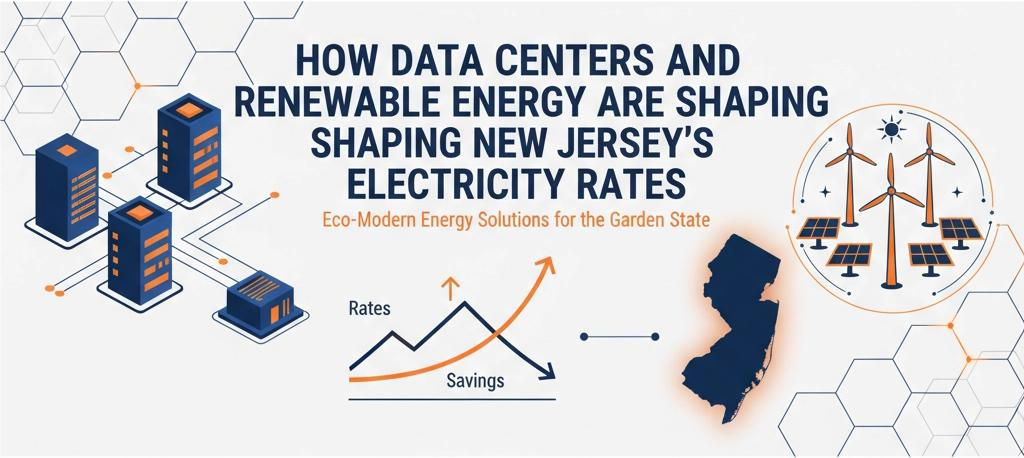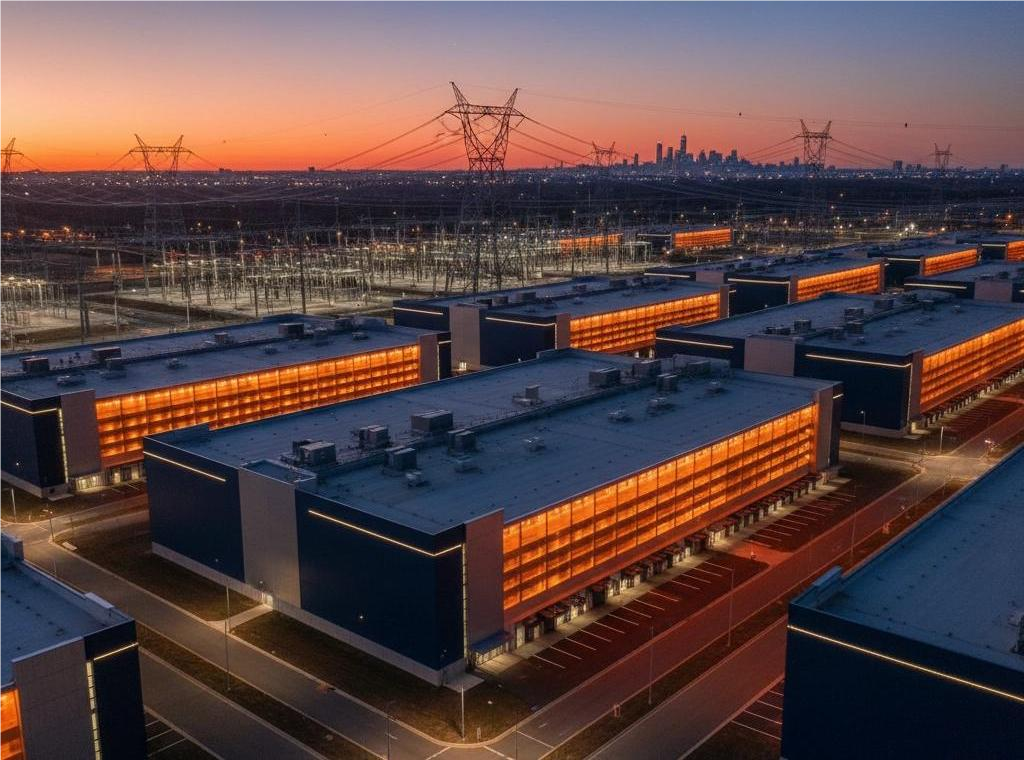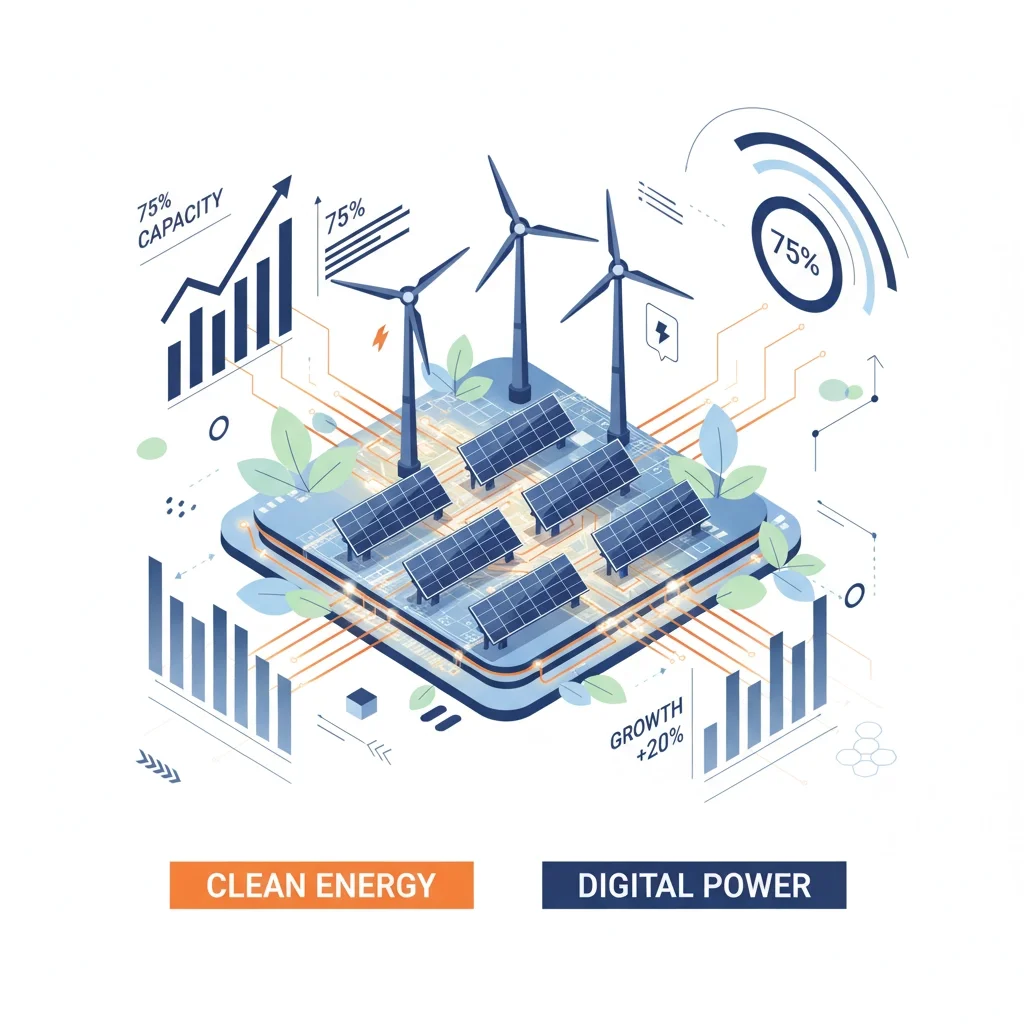How Data Centers and Renewable Energy Are Shaping New Jersey's Electricity Rates
If you're a New Jersey business owner, you've likely noticed your electricity bills climbing higher than ever. The culprit? A perfect storm of surging data center demand and renewable energy growing pains that's fundamentally reshaping the Garden State's energy landscape. With electricity rates jumping 21% across New Jersey and no signs of slowing down, understanding these market forces isn't just helpful: it's essential for your bottom line.
The Data Center Boom Driving Up Your Energy Costs
New Jersey has become ground zero for the artificial intelligence revolution, hosting approximately 75 AI data centers that are consuming electricity at unprecedented rates. These aren't your typical office buildings: a single 100-megawatt data center devours enough electricity to power between 100,000 and 166,000 homes.
The numbers tell a stark story. Data centers currently consume 5% of New Jersey's total electricity supply, but that figure is projected to more than double by 2030. Within the broader PJM Interconnection system that serves 13 states including New Jersey, data centers account for 4% of current load but are expected to reach 12% by 2030. Some projections suggest they could consume nearly a quarter of the region's total electricity by 2040.
Tech giants like Amazon, Google, and Microsoft are rapidly expanding their footprint across the state. The new Nebius data center under construction in Vineland will use up to 300 megawatts: equivalent to a small nuclear reactor: when it comes online in fall 2025.
This explosive growth directly impacts your business through higher wholesale energy rates. The overall load growth in PJM has accelerated from around 1% per year to 3% annually, with projections reaching 5% per year over the next decade. Peak demand is expected to reach 154 gigawatts, the highest in regional history.
How New Jersey's Deregulated Market Amplifies the Impact
Unlike many states, New Jersey operates in a deregulated electricity market, which means businesses like yours can choose their energy supplier. While this creates opportunities for savings, it also means you're more directly exposed to wholesale market volatility driven by supply and demand imbalances.
The current crisis stems from a fundamental mismatch: electricity demand is skyrocketing, but supply isn't keeping pace. Aging coal and natural gas plants representing 21% of PJM's capacity are being retired through 2030, while new generation interconnections aren't happening fast enough to replace them or meet growing demand.
In New Jersey's deregulated environment, these wholesale market pressures translate directly into higher rates for businesses that haven't secured favorable long-term contracts. The state's Board of Public Utilities has identified PJM's recent capacity auction results as the main driver of the 21% rate increases hitting businesses across the state.
For your business, this means the traditional approach of simply accepting utility default rates could be costing you thousands of dollars annually. The volatility also makes energy contract negotiation more critical than ever.
The Renewable Energy Opportunity Hidden in the Crisis
While data centers are driving up demand, they're also accelerating the renewable energy transition in unexpected ways. New Jersey regulators are exploring a "bring your own clean energy" model that would require data center companies to build and use their own solar farms and wind farms rather than drawing from the existing grid.
Proposed legislation (S4143) would make this requirement law, ensuring that large energy users bear the cost of their consumption rather than passing it to businesses like yours. This approach recognizes that the corporations benefiting most from New Jersey's business climate should contribute to the infrastructure needed to support their operations.
For forward-thinking businesses, this shift creates opportunities. As more renewable capacity comes online to serve data centers, it could eventually help stabilize wholesale energy rates. Companies that position themselves to take advantage of renewable energy opportunities now may find themselves with competitive advantages as the market evolves.
The key is understanding that renewable energy isn't just about environmental benefits: it's becoming a critical component of long-term cost management in New Jersey's evolving energy landscape.
What New Jersey Businesses Can Do Right Now
Don't let rising energy costs catch you off guard. Here are five concrete steps you can take to protect your business from the ongoing market upheaval:
1. Audit Your Current Energy Contract
Review your existing agreement immediately. If you're on a variable rate or approaching contract renewal, you're vulnerable to the full impact of rising wholesale rates. Understanding wholesale energy rates can help you negotiate better terms.
2. Lock in Fixed Rates Where Possible
With volatility expected to continue through 2026, fixed-rate contracts provide crucial cost certainty. Even if current fixed rates seem high, they may look reasonable compared to future market conditions.
3. Implement Energy Management Systems
Real-time monitoring helps identify usage patterns and peak demand charges that significantly impact your bill. Many businesses discover 15-20% savings simply by understanding when and how they use electricity.
4. Explore Demand Response Programs
New Jersey utilities offer programs that pay businesses to reduce electricity usage during peak demand periods. These programs become more valuable as grid stress increases.
5. Consider Professional Energy Consulting
The complexity of New Jersey's deregulated market, combined with unprecedented volatility, makes professional guidance invaluable. Experienced energy consultants can navigate supplier relationships and market timing that individual businesses struggle to manage alone.
Looking Ahead: Preparing for Long-Term Changes
The transformation of New Jersey's electricity market isn't a temporary disruption: it's a fundamental shift that will define energy costs for the next decade. Data centers will continue expanding, renewable energy deployment will accelerate, and market volatility will remain elevated as supply struggles to match demand.
Successful businesses are already adapting their energy strategies to this new reality. They're treating energy procurement as a core business function rather than an afterthought, investing in efficiency measures that provide immediate returns, and building relationships with suppliers and consultants who understand the changing landscape.
The businesses that thrive will be those that recognize energy management as a competitive advantage rather than just a cost center. In New Jersey's evolving market, the difference between proactive and reactive energy management could mean thousands of dollars in annual savings: or losses.
The data center boom and renewable energy transition are reshaping New Jersey's electricity landscape whether we're ready or not. The question isn't whether these changes will affect your business: it's whether you'll be prepared to navigate them successfully. By understanding the market forces at play and taking proactive steps now, you can protect your business from rising costs while positioning yourself to benefit from the opportunities ahead.
At United Energy Consultants, we help New Jersey businesses navigate these complex market conditions with proven strategies that reduce costs and manage risk. Contact us to learn how we can help your business thrive in the new energy economy.






